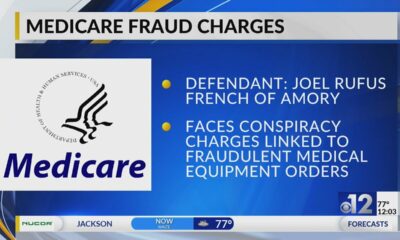Mississippi Today
MAP: Mississippi makes it uniquely hard for low-income new moms to get health care
MAP: Mississippi makes it uniquely hard for low-income new moms to get health care
Low-income women in Mississippi have less access to health care in the months after giving birth than their counterparts in every state except Wyoming.
Mississippi and Wyoming are now the only two states in the country that have neither expanded Medicaid eligibility to low-income working adults, nor extended postpartum Medicaid coverage for new mothers beyond 60 days after birth, according to data compiled by the health nonprofit KFF.
The other nine states that have not expanded Medicaid eligibility have all sought to extend postpartum coverage in recent years. Seven of them, including Alabama, Tennessee, Georgia and South Carolina, have extended coverage to a year after birth. Texas and Wisconsin have sought federal approval to implement shorter extensions of six months and 90 days, respectively.
“We know infant mortality and maternal health are challenges for our state,” said Tennessee Gov. Bill Lee, a Republican who opposes Medicaid expansion, when he introduced his proposal to extend postpartum coverage in 2020. “One in two Tennessee births are covered through our Medicaid program.”
In Mississippi, that number is higher: about six in 10 births are covered by Medicaid.
During the ongoing COVID-19 federal public health emergency, states are not allowed to kick anyone off Medicaid. As a result, women who have given birth since March 2020 will have coverage until the emergency is lifted, potentially as soon as early 2023.
But ordinarily, a Mississippi woman with two kids and a partner together earning $3,000 a month, for example, would lose her Medicaid coverage two months after her baby is born.
The same woman living in Alabama, which has not expanded Medicaid eligibility but approved a 12-month postpartum coverage extension earlier this year, would have health insurance until her baby is a year old. And the same woman living in Arkansas, which has expanded Medicaid but not extended postpartum coverage, would have health insurance before and after her pregnancy, because she would be eligible based solely on her income.
In Mississippi, women whose pregnancies are covered by Medicaid lose the ability to go to check-ups, get treatment for postpartum depression, and receive care for chronic conditions when their babies are just two months old.

House Speaker Philip Gunn, R-Clinton, has repeatedly rejected postpartum Medicaid extension, which easily passed the Senate last session. He has described the proposal as Medicaid expansion, though it would not make more people eligible for Medicaid. Almost every other state that has refused to expand Medicaid has nevertheless extended postpartum coverage.
Last week, some of the state's leading doctors told the Senate Medicaid Committee that extending postpartum Medicaid would not only improve abysmal maternal and infant health outcomes but also save money.
Mississippi has the country's highest infant mortality rate and highest rate of premature births. Dr. Anita Henderson, a pediatrician and president of the Mississippi Chapter of the American Academy of Pediatrics, said the hospital cost of delivering a healthy baby at full term is typically around $5,000 to $6,000. But an extremely preterm baby requires a long stay in a neonatal intensive care unit (NICU), at an average cost of $600,000.
State Health Officer Dr. Daniel P. Edney mentioned that Mississippi is one of just two states that has neither extended postpartum coverage nor expanded Medicaid eligibility.
“What I would beg us to consider is the fact it makes much more economic sense to let Medicaid pay for this rather than the state having to pay for it – either state agencies such as the health department paying, or hospitals paying for it with uncompensated care,” he said.
Pregnant women in Mississippi qualify for Medicaid as long as their family income is below 194% of the federal poverty level– about $4,600 per month for a family of four.
But after giving birth, a Mississippian with kids qualifies for Medicaid only if she has a very low income, earning $578 or less monthly for a family of four.
With such a strict income eligibility requirement, it's all but impossible for anyone with a full-time job to qualify for Medicaid coverage. (And healthy adults without kids never qualify for Medicaid in Mississippi.)
In states that have expanded Medicaid, including Louisiana and Arkansas, adults with incomes below 138% of the federal poverty level, or about $3,200 for a family of four, qualify for health insurance.
An analysis by the consulting firm Manatt found that expanding eligibility for Medicaid would cut enrollment in pregnancy Medicaid by about half, because many women would qualify based on income alone.
Wil Ervin, deputy administrator for health policy for Mississippi Medicaid, told the Senate Medicaid Committee last week that extending postpartum coverage to a year would cost the state about $7 million.
This article first appeared on Mississippi Today and is republished here under a Creative Commons license.
Mississippi Today
On this day in 1959


April 18, 1959

About 26,000 students took part in the Youth March for Integrated Schools in Washington, D.C. They heard speeches by Martin Luther King Jr., A. Phillip Randolph and NAACP leader Roy Wilkins.
In advance of the march, false accusations were made that Communists had infiltrated the group. In response, the civil rights leaders put out a statement: “The sponsors of the March have not invited Communists or communist organizations. Nor have they invited members of the Ku Klux Klan or the White Citizens' Council. We do not want the participation of these groups, nor of individuals or other organizations holding similar views.”
After the march, a delegation of students went to present their demands to President Eisenhower, only to be told by his deputy assistant that “the president is just as anxious as they are to see an America where discrimination does not exist, where equality of opportunity is available to all.”
King praised the students, saying, “In your great movement to organize a march for integrated schools, you have awakened on hundreds of campuses throughout the land a new spirit of social inquiry to the benefit of all Americans.”
This article first appeared on Mississippi Today and is republished here under a Creative Commons license.![]()
Mississippi Today
Bill would limit how long those convicted could seek relief, even if wrongfully convicted

Legislation being debated in a conference committee would restrict how “Goon Squad” victims and others can get relief if they have been wrongfully convicted.
House Bill 1253 would impose a one-year limitation on newly discovered evidence.
The bill passed the House. The Senate passed an amended version. The House invited conference. Conferees are Kevin Horan, Lance Varner and Celeste in the House and Joey Fillingane, Daniel Sparks and Derrick Simmons in the Senate.
“It would impact the constitutional right to access the courts in Mississippi by any inmate — innocent persons and Goon Squad victims included,” Krissy Nobile, director of the Mississippi Office of Capital Post-Conviction Counsel, said of HB 1253. “It is terrible legislation that is detached from how the legal system actually works.”
Mississippi Attorney General Lynn Fitch's office, which has been pushing for the passage, defends the bill.
“HB 1253 streamlines the pathway to justice and closure for victims of crime and families of homicide victims, restoring some balance to the post-conviction appellate process,” said Fitch's chief of staff, Michelle Williams. “It would be a wonderful way to mark Crime Victims' Rights Week next week with passage of this important legislation.”
The bill is being touted as a way to streamline appeals of those who have been convicted, but defense lawyers worry that this change may erode constitutional rights.
In January 2023, five deputies for the Rankin County Sheriff's Department and a Richland police officer, who were part of a “Goon Squad” operation, broke into a house without a warrant, tortured two Black men, Michael Corey Jenkins and Eddie Terrell Parker, threatened to use a sex toy on them and shoved a gun in Jenkins' mouth and shot him. To conceal their crimes, they destroyed surveillance footage, planted false evidence and lied to investigators.
Last month, a federal judge sentenced those officers to between 18 and 40 years in prison. They received similar sentences in state court.
But an investigation by the Mississippi Center for Investigative Reporting at Mississippi Today and The New York Times uncovered allegations that torture, coerced statements and false incident reports involving, not only these six officers, but more than a dozen others with cases that may stretch back two decades. Some of those interviewed alleged that deputies also planted evidence and filed false charges against them.
Rankin County District Attorney Bubba Bramlett has said his office is examining pending cases involving these six officers. In any cases where their testimony was essential or the integrity of the investigation may have been compromised, those cases are being dismissed, he said.
But Bramlett has declined to explain how far back his office will look, and questions remain about how many of those arrested by the Rankin County Sheriff's Department on drug charges have been either wrongfully charged or convicted.
State Public Defender Andre de Gruy sees problems with this legislation for cases involving claims of wrongful convictions.
“For this [Goon Squad] scandal, it would be one year from passage,” said State Public Defender Andre de Gruy. “Future scandals might be harder to predict, and a lawyer miscalculating and not filing on time would not be an excuse.”
Nobile said a one-year window is hardly enough time to develop new evidence and file a petition. “The discovery of new evidence and the development in forensic sciences sometimes takes years to develop,” she said.
For instance, the last five people exonerated from Mississippi's death row were wrongfully imprisoned for 22 years on average, she said.
If this new bill had been the law, she said these five people might have been executed, only for them to be exonerated after their deaths.
Nobile said the Mississippi Supreme Court has recently decided that it has no power to recognize constitutional rights after someone is convicted, even if those rights are violated.
“My concern about the core constitutional rights is that they deserve to be protected because they are, by their very nature, in the state and-or federal constitution,” she said. “When a person's criminal case is infected with constitutional defects, especially when a verdict is made unsafe as a result, finality is not a legitimate interest. In that event, finality is a fiction, and all that exists is an interest in expediency.”
This article first appeared on Mississippi Today and is republished here under a Creative Commons license.![]()
Mississippi Today
‘If you can’t vote, you’re nobody:’ Lawmakers hear from rehabilitated felons who still can’t exercise right

Kenneth Almons has not received so much as a speeding ticket since he was released from the Mississippi State Penitentiary nearly three decades ago, but a punitive state policy still forces him to carry a sense of shame each day.
At 51, he's run his own business, currently works for the city of Jackson, has raised three children and has, by most standards, been a picture-perfect example for what state officials would consider being rehabilitated and re-entering society.
But because he was convicted of armed robbery and aggravated assault at 17 years old, he still cannot cast a vote in a Mississippi election.
“We all make mistakes,” Almons told a group of state lawmakers on Wednesday. “Some are just greater than others.”
Almons is one of thousands of Mississippians who have lost their right to vote for life because of a Jim Crow-era provision in the state constitution that imposes a permanent voting ban on people who have been convicted of certain felony offenses.
The white supremacist drafters of Mississippi's 1890 Constitution first established a list of disenfranchising crimes they believed at the time were more likely to be committed by Black people.
Under the Mississippi Constitution, people convicted of any of 10 felonies — including perjury, arson and bigamy — lose their voting rights for life. Opinions from the Mississippi Attorney General's Office since expanded the list of disenfranchising felonies to 23, including armed robbery.
About 55,000 names are on the Secretary of State's voter disenfranchisement list as of March 19. The list, provided to Mississippi Today through a public records request, goes back to 1992 for felony convictions in state court.
Lawmakers who attended the hearing asked Almons, who served five years in state prison, what it would mean if the state restored his voting rights.
“It would mean I'm no longer a nobody,” Almons responded. “And if you can't vote, you're nobody. And in the public's eye, I'm a nobody.”
The GOP-majority House overwhelmingly passed legislation earlier this session along bipartisan lines that would have automatically restored voting rights to people who served their sentences for nonviolent felonies. But Senate Constitution Chairman Angela Burks Hill, a Republican from Picayune, killed the measure by not bringing it up for a vote in committee.
The House measure likely would not have restored Almons' suffrage because armed robbery is considered a violent crime, but it would have created a pathway for thousands of other Mississippians to regain their voting rights.
Democratic Rep. Kabir Karriem of Columbus criticized Hill's decision to kill the House measure but said her inaction should galvanize lawmakers and other advocates to double down on their efforts to advance suffrage legislation.
“Restoring voting rights is not merely a political matter,” Karriem said. “It is a fundamental human rights issue. The right to vote is the cornerstone of our democracy.”
Hill did not respond to a request for comment, but she previously told Mississippi Today she decided not to take the felony suffrage measure up because the “Constitution speaks for itself.”
Though the House's major suffrage bill is dead, lawmakers can still introduce individual bills to restore voting rights on behalf of citizens, but the process is burdensome. It requires two-thirds of lawmakers in both legislative chambers to vote in favor of restoring suffrage in individual cases.
“We have a process in the Legislature that helps to restore individuals' voting rights, but it is a terrible process,” Democratic Rep. Zakiya Summers of Jackson said. “And it's a cumbersome process. And there really is no easy way to navigate it.”
The Legislature last year did not pass any suffrage restoration bills. A person can also seek a gubernatorial pardon, though no executive pardon has been handed down since Gov. Haley Barbour's final days in office in 2011.
Lawmakers in both chambers of the Capitol have filed around 50 individual suffrage bills so far this session. The speaker of the House and the lieutenant governor have referred those bills to the respective Judiciary B committees for consideration.
Neither committee is currently scheduled to conduct a meeting on the suffrage bills, but lawmakers can consider those measures until the last remaining days of the 2024 session.
This article first appeared on Mississippi Today and is republished here under a Creative Commons license.![]()
-

 Mississippi News4 days ago
Mississippi News4 days agoMississippi will soon be bombarded with cicadas
-

 SuperTalk FM3 days ago
SuperTalk FM3 days ago4 tornadoes touched down in Mississippi during latest round of severe storms
-

 SuperTalk FM4 days ago
SuperTalk FM4 days ago2 Jones County correctional officers arrested in smuggling bust
-

 SuperTalk FM1 day ago
SuperTalk FM1 day agoChance of parole denied for man who killed 3 Choctaw Indian tribal members
-

 Mississippi News6 days ago
Mississippi News6 days agoColumbus schools may see needed upgrades with bond issue
-

 Local News4 days ago
Local News4 days agoAlmost 3,500 Mississippi Veterans have enrolled in VA health care in past 365 days, 28% increase over last year
-

 Kaiser Health News1 day ago
Kaiser Health News1 day agoTo Stop Fentanyl Deaths in Philadelphia, Knocking on Doors and Handing Out Overdose Kits
-

 SuperTalk FM7 days ago
SuperTalk FM7 days agoExplosion at elementary school in Mississippi Delta hospitalizes two employees
























